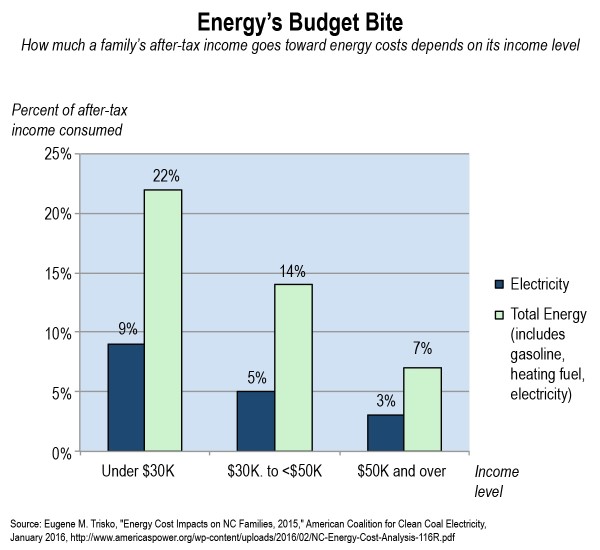- NC’s standard in law for electricity provision is least-cost, reliable electricity at the flip of a switch
- State electricity policy, however, is too often directed by “stakeholders” whose desires clash with that legal standard, to the detriment especially of poor consumers
- House Bill 529 would restore and boost the state’s protection of electricity consumers from unnecessarily high costs
In North Carolina, you have no choice in who provides you electricity. The state considers electricity a “natural monopoly.” For that reason, North Carolina law concerning electricity provision calls for “adequate, reliable and economical utility service to all of the citizens and residents of the State” and, just as important, “the least cost mix of generation and demand-reduction measures which is achievable.”
Least-cost, reliable electricity at the flip of a switch is what people expect, and the law is supposed to uphold those expectations.
Nevertheless, electricity policy in North Carolina is notorious for being debated among “stakeholders,” who by definition have a business or political interest at stake. Those interests very often clash with the clear interest of people in getting least-cost and reliable electricity.
For example, Gov. Roy Cooper identified 164 stakeholders to develop his expensive and risky “Clean Energy Plan.” When those stakeholders were asked to identify their priorities for electricity provision, only seven percent reported interest in valuing “Affordability” and “Reliability.” One of the major contributors to Cooper’s plan even came from the perspective that having “cheap, clean, abundant energy” would be “just short of disastrous.”
Electricity isn’t just any consumer good, however. Monopoly electric utilities are providing a basic human need. Causing rates to go higher than necessary affects people deeply. Research shows that lower energy prices save lives, but higher energy prices cost lives. According to the U.S. Energy Information Agency, one in five families had to forego food or medicine just to pay their energy bills.

Energy poverty is a serious issue, which is why responsible policymakers should be vigilant to protect consumers from it.
Restoring and boosting protections to North Carolina’s top electricity stakeholders
A bill before the General Assembly would restore and boost the state’s protection of North Carolina’s electricity consumers. Sponsored by Reps. Larry G. Pittman, George G. Cleveland, Keith Kidwell, Mark Brody, and Jeffrey C. McNeely, House Bill 529 as filed would make several key changes to protect electricity consumers in NC from unnecessarily higher costs. Among them:
- It would state that it is the state’s policy to promote the development of “the lowest cost electric power that will promote economic growth,” which would be done “by providing public utilities the choice to promote use of any type of energy resource free of State interference or control.” This policy would strengthen the state’s standards regarding electric provision being least-cost, reliable electricity at the flip of the switch.
- It would declare that the resources necessary to meet future growth and needs should be available at “reasonable cost.”
- It would eliminate the Renewable Energy and Energy Efficiency Portfolio Standards (REPS), which have become moot for 95 percent of the state under Duke Energy and Duke Energy Progress but not for customers of municipal utilities and electricity membership corporations (EMCs). After REPS was enacted, NC’s electricity rates began growing faster than rates in the region as well as the nation. No other Southeastern state mandated a REPS law.
- It would forbid electric public utilities from charging a rate higher than what the utility would have charged “based on the lowest cost electric generation available” to the utility at the time.
- It would have the annual report from the NC Utilities Commission to the governor, legislature, and other policymakers to include a report on “the cost impact on the production and transmission of electricity for electric power suppliers and their retail customers resulting from the use of renewable resources.”
- It would stipulate that Demand-Side Management (DSM) actions by the utility must include “customer approval” and no longer consider DSM options part of “reliable utility service.”
- It would stipulate that when the Environmental Management Commission adopts rules determining the Best Available Control Technology (BACT) to limit a facility’s emissions of air pollutants, it shall not consider carbon dioxide an air pollutant given that carbon dioxide is “a naturally occurring atmospheric gas that is necessary to the health of plant life and enables the production of oxygen by plant life, which is necessary to sustain animal life.”
- It would no longer allow electric utilities to charge customers for conducting research into developing renewable energy, energy efficiency, or improved air quality, which of course is outside the customer’s use of their service.
As long as NC ratepayers have no choice in who sells them electricity, the state absolutely must protect them from unnecessary costs and spotty service. Least-cost, reliable service at the flip of the switch must be the legal standard.
Given how vital electricity is to people, the business interests of well-connected stakeholders and high-cost ideologues should take a back seat to doing what’s right for electricity consumers. It is not only unjust to force captive ratepayers to pay any more than absolutely necessary, it can even be dangerous.


